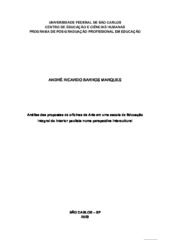| dc.contributor.author | Marques, André Ricardo Barros | |
| dc.date.accessioned | 2023-05-23T14:24:50Z | |
| dc.date.available | 2023-05-23T14:24:50Z | |
| dc.date.issued | 2023-03-28 | |
| dc.identifier.citation | MARQUES, André Ricardo Barros. Análise das propostas de oficinas de arte em uma escola de Educação Integral do interior paulista numa perspectiva intercultural. 2023. Dissertação (Mestrado em Educação) – Universidade Federal de São Carlos, São Carlos, 2023. Disponível em: https://repositorio.ufscar.br/handle/ufscar/18057. | * |
| dc.identifier.uri | https://repositorio.ufscar.br/handle/ufscar/18057 | |
| dc.description.abstract | This research sought to analyze the effects of art workshops on the integral development of students at a school in the interior of São Paulo from the perspective of teachers in an Intercultural perspective. It was also sought to analyze which are the conceptions of integral education adopted by the teachers of the workshops involved in the project; verify the format of the workshops and whether they contribute to the integral development of the student; examine how the themes and contents of the proposed workshops are chosen; and to find out which teaching strategies are used in the Art workshops. In the bibliographical review, we seek to understand the integral education models of Anísio Teixeira and Darcy Ribeiro, the social function of the school, the curriculum, the concepts of Integral Education, and the importance of teaching art from authors such as: Antonilo (2012), Barbosa, (2016), Cavalcante (2013), Cavaliere (2009), Clemente (2013), Goncalvez (2006), Moll, Posser and Almeida (2016). Our theoretical framework is supported by the Critical Interculturality proposed by Vera Candau. A qualitative research was carried out with semi-structured interviews with four teachers working in art workshops. The data allowed us to conclude that there are two conceptions of Integral Education in the school: the vision of integral education more linked to the increase of the student's permanence time in the school and of assistance character; and the vision of an education that contemplates learning different from those worked on in regular education in a way that develops the student in an integral way. It was also possible to apprehend that the researched art workshops collaborate for the development of different skills besides cognitive and motor skills, such as sociability, autonomy and emotional intelligence. Finally, it was possible to perceive that the themes and contents worked on are free and malleable, which seems to be an educational advantage and, therefore, the teachers seem to adapt the workshops according to the needs of the classes and the children. | eng |
| dc.description.sponsorship | Não recebi financiamento | por |
| dc.language.iso | por | por |
| dc.publisher | Universidade Federal de São Carlos | por |
| dc.rights | Attribution 3.0 Brazil | * |
| dc.rights.uri | http://creativecommons.org/licenses/by/3.0/br/ | * |
| dc.subject | Educação integral | por |
| dc.subject | Oficinas de artes | por |
| dc.subject | Interculturalidade crítica | por |
| dc.subject | Integral education | eng |
| dc.subject | Art workshops | eng |
| dc.subject | Critical interculturality | eng |
| dc.title | Análise das propostas de oficinas de arte em uma escola de Educação Integral do interior paulista numa perspectiva intercultural | por |
| dc.title.alternative | Analysis of the proposals for art workshops in an Integral Education school in the interior of São Paulo from an intercultural perspective | eng |
| dc.type | Dissertação | por |
| dc.contributor.advisor1 | Galizia, Fernando Stanzione | |
| dc.contributor.advisor1Lattes | http://lattes.cnpq.br/4007795540173093 | por |
| dc.description.resumo | A presente pesquisa buscou analisar os reflexos das oficinas de artes no desenvolvimento integral dos alunos de uma escola no interior de São Paulo sob a ótica dos professores numa perspectiva Intercultural. Buscou-se ainda analisar quais são as concepções de educação integral adotadas pelos professores das oficinas envolvidos no projeto; verificar o formato das oficinas e se estas contribuem para o desenvolvimento integral do aluno; examinar como são escolhidos os temas e conteúdos das oficinas propostas; e averiguar quais estratégias de ensino são utilizadas nas oficinas de Arte. Na revisão bibliográfica buscamos entender os modelos de educação integral de Anísio Teixeira e Darcy Ribeiro, a função social da escola, o currículo, os conceitos de Educação Integral, e a importância do ensino de arte a partir de autores como: Antonilo (2012), Barbosa, (2016), Cavalcante (2013), Cavaliere (2009), Clemente (2013), Goncalvez (2006), Moll, Posser e Almeida (2016). Nosso referencial teórico tem como suporte a Interculturalidade Crítica proposta por Vera Candau. Foi desenvolvida uma pesquisa de caráter qualitativo com a realização de entrevistas semiestruturadas com quatro professoras atuantes em oficinas de artes. Os dados nos permitiram concluir que existem na escola duas concepções de Educação Integral: a visão de educação integral mais ligada ao aumento do tempo de permanência do aluno na escola e de caráter assistencialista; e a visão de uma educação que contemple aprendizados diferentes dos trabalhados no ensino regular de modo que desenvolvam o estudante de forma integral. Também foi possível apreender que as oficinas de arte pesquisadas colaboram para o desenvolvimento de habilidades diversas além das cognitivas e motoras, tais como sociabilidade, autonomia e inteligência emocional. Por fim, foi possível perceber que os temas e conteúdos trabalhados são livres e maleáveis, o que parece ser uma vantagem educacional e, dessa forma, as professoras parecem adaptar as oficinas de acordo com as necessidades das turmas e das crianças. | por |
| dc.publisher.initials | UFSCar | por |
| dc.publisher.program | Programa de Pós-Graduação Profissional em Educação - PPGPE | por |
| dc.subject.cnpq | CIENCIAS HUMANAS::EDUCACAO::CURRICULO | por |
| dc.subject.cnpq | CIENCIAS HUMANAS::EDUCACAO::ENSINO-APRENDIZAGEM | por |
| dc.publisher.address | Câmpus São Carlos | por |
| dc.contributor.authorlattes | http://lattes.cnpq.br/6866980296373593 | por |

